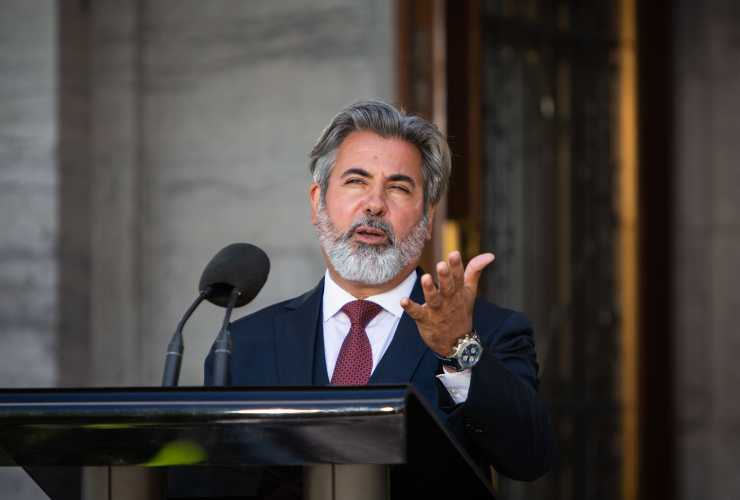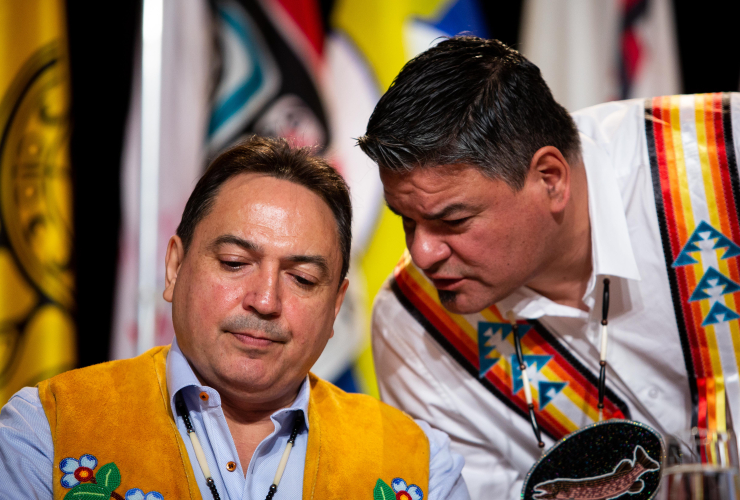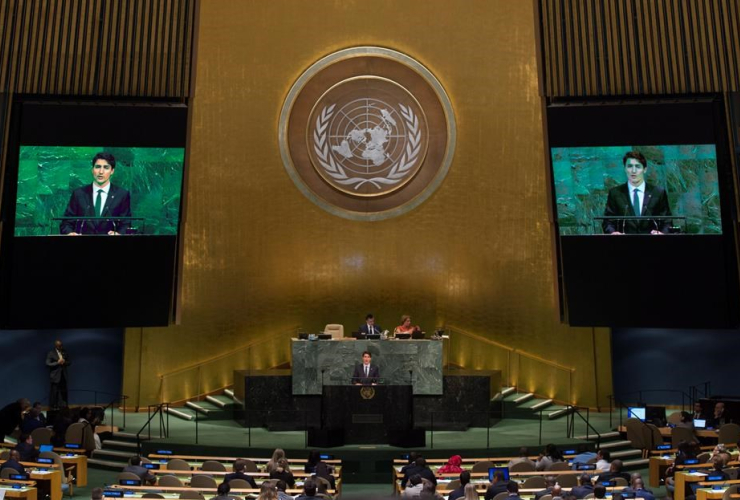Prime Minister Justin Trudeau publicly warned a First Nations leader against disparaging communities that have agreed to allow the Trans Mountain pipeline across their land in exchange for economic benefits.
The remarkable exchange took place when Judy Wilson, who is chief of the Neskonlith Band and secretary treasurer of the Union of B.C. Indian Chiefs, confronted Trudeau at a gathering of First Nations leaders in Ottawa.
Wilson has been outspoken in her opposition to the proposed Alberta-B.C. pipeline. She was the first to question Trudeau after he finished a speech in a packed room at the Westin hotel, where the Assembly of First Nations (AFN) was holding its 2018 special chiefs assembly.
During his remarks, Trudeau had stated his government’s commitment to introducing two pieces of federal legislation, on child welfare and on Indigenous languages, when Parliament returns from winter break. He also spoke about his vision of a “new relationship” with Indigenous peoples “guided by recognition of rights” and decolonization of laws.
Wilson praised that work, but then raised the issue of Trudeau’s 2017 speech to the United Nations — which AFN National Chief Perry Bellegarde mentioned positively when he introduced Trudeau. Wilson contrasted the speech to his government’s actions on Trans Mountain.
“I applaud the work we’re doing on children and families, and languages,” Wilson said, “but, Prime Minister, when you’re talking about the United Nations, and you’re going to go along with self-determination and consent, why wasn’t that applied with the Trans Mountain pipeline that’s going through 413 kilometres of our territory?”
The crowd broke into applause as Wilson continued, appearing to question the signing of some impact benefit agreements (IBAs) in some communities along the pipeline route.
“There was no consent on that, and you can’t count a few IBAs that you’ve done with some of the communities as consent, because it’s the proper title-holders of those nations that hold the title, and it’s the bands that might have been under duress — or whatever reasons they did that — but it’s not a proper process at all.”

'We should respect people's choices': Trudeau
Standing on stage, Trudeau replied, “I appreciate those words very much, Judy, thank you.” Then he did something unusual: he questioned the questioner.
“I would be careful about minimizing or ascribing reasons for people who take positions that disagree with you,” he said to Wilson.
“I think there are lots of reasons, and I think we should respect people’s choices to support or not support different projects, and I don’t think we should be criticizing them, just because they disagree with you, Judy.”
At this point, the room had become quieter. Trudeau said he recognized that the pipeline project is a “process.”
“The process of respect and partnership means engaging in real, substantive conversations, listening to concerns, and responding to those concerns,” said the prime minister.
“From the very beginning, we recognized that the previous government had failed. Failed to engage appropriately, with communities, with Indigenous peoples, and indeed with the environmental science that needed to happen, before people in general would allow them to move forward on getting our resources to markets other than the United States.”
Earlier this year in an interview with National Observer, Trudeau acknowledged some communities support the pipeline and others do not. He said at that time that individual Indigenous communities are not monolithic. "They all have different perspectives. We’ve got impact benefit agreements with 42 different Indigenous communities along the proposed twinning route and they are very supportive of this pipeline. Others have concerns."
To the First Nations leaders at the hotel, Trudeau addressed the Federal Court of Appeal’s quashing of the government’s approval of the pipeline, characterizing it as the courts saying “no, you have to do it better, you have to engage in it further” and said “we are in the process now of going back and listening even more.”

'That's what happens in North Korea'
Trudeau then tried to draw a contrast between unanimity and majorities, illustrating his point with two lighthearted comments that provoked laughter.
“This is a process that we are engaging in in good faith, in full respect. But it is not a process that ever is going to give unanimity,” he said. “I am prime minister not because 100 per cent of people in this country voted for me — that’s what happens in North Korea.”
The crowd broke into laughter, and a smile crossed Trudeau’s face as he continued. “I am prime minister because we have a system that came through, and asked me and offered me the job to serve as prime minister. That is how we move forward,” he said.
“We know that the only way to move forward as a country on resource projects, big and small...is in true and genuine partnership with Indigenous peoples. That doesn’t mean we’re going to be able to get everyone to agree all the time. I know the AFN manages to get everyone to agree all the time on all sorts of things.” That provoked another round of laughter.
Trudeau’s explanation of the tricky politics surrounding Trans Mountain served to highlight how uneasy some First Nations peoples are with a government that has paid billions of dollars of public funds to purchase a pipeline project following serious questions about whether the approval process was rigged, and a federal court ruling that said the government didn’t properly conduct consultations.
The prime minister also apologized to Coldwater Chief Lee Spahan who raised concerns about the pipeline project crossing an aquifer in his community and called the consultation proces "flawed."
"I could explain and try to justify it by saying we are starting from a standing start from a (previous) government that hadn't done any consultations adequately over 10 years," said Trudeau. "But that's not good enough as a reason. I apologize for that. We didn't do a good enough job."

New child welfare, languages bills next month
It threatened to overshadow the news the prime minister highlighted in his speech: his promise to introduce new legislation to address child welfare and Indigenous languages. The latter is aimed at helping revive dozens of dying languages in Canada. “A new relationship means working together on legislation to preserve and protect Indigenous languages, which we’ll introduce in Parliament this January,” said Trudeau during his speech.
Trudeau said it was “fitting” to introduce the bill next year “because after all, 2019 is the International Year of Indigenous Languages.” The year of recognition is being facilitated by the United Nations Educational, Scientific and Cultural Organization (UNESCO).
It was almost two years to the day that Trudeau first promised the bill during a Dec. 6, 2016 special chiefs assembly across the Ottawa River in Gatineau, Que. Trudeau addressed that length of time in an answer to another question, saying “it does take a little longer to get things done through consultation and partnership, but it is the only way to create real lasting change that you can have ownership over.”
Indigenous leaders say such legislation can help allow Indigenous languages to be used in day-to-day government services. The Truth and Reconciliation Commission has also called for such an act. The residential school system prohibited the use of such languages, in a horrific attempt to erase them from memory.
Indigenous Services Minister Jane Philpott has also indicated recently that the government will introduce child welfare legislation co-developed with Indigenous communities and leaders.
“Indigenous children should not be forcibly taken away from their homes and their parents – that’s why we’re making it right,” Trudeau said at another point.
“This legislation, which we will table in January, will affirm inherent and treaty rights to exercise jurisdiction over children and families,” said Trudeau.
“As a result, we’ll put kids first, have fewer children in care, and reunite more families. Indigenous communities must be in the driver’s seat. As parents and as communities, you know what’s best for your kids. It’s time we respected that.”
Bellegarde, when introducing the prime minister, said it was the fourth time in a row Trudeau has appeared at the gathering. He heaped praise on the UN speech in 2017, saying it was the first time he could recollect that the head of a nation-state did such “truth-telling” about Canada’s colonial history.
Editor's note: This story was updated at 9:00 a.m. ET on Dec. 5, 2018 to add additional comments from Trudeau.
Trudeau cannot be believed on
Trudeau cannot be believed on these issues. He made promises to Canadians in 2015 but has not made the promised changes. Canada still subsidizes the oil industry to the tune of $2 billion annually. And then he gives $4.5 billion to an American corporation (controlled by the same people who ran Enron) for a worthless, stranded asset. He speaks with a forked tongue. Consultation includes accommodation, and there is no way to accommodate for an oil spill, for the loss of the nature.
Negotiating with people is
Negotiating with people is fine. We all understand that 100 percent agreement is an aspiration and it's OK to have 51 percent agreement on most issues before moving forward. But there is no room for negotiating on the negative climate and environmental effects of extracting tar sands and piping it across the land to be burned somewhere else. Fine arguments about the price of oil or the national interest or who is more right are just sophistry when sea levels are rising and fires are raging and floods are inundating the land. There is more to leadership than just winning the next election.
It is particularly disgusting
It is particularly disgusting for Justin to insult chief Judy by saying that the reasons why some Indigenous groups along the proposed pipeline route who caved in to signing IBAs need not be entered into the discussion!! Of course they are! It's all part of our colonial history - one that we should be learning from!
I'm still waiting for someone to make the absolutely necessary distinction between CONSULTATION and CONSENT!! The feds treat these two very distinct concepts as equivalent, but they're NOT!!
Trudeau: “This is a process
Trudeau: “This is a process that we are engaging in in good faith, in full respect. But it is not a process that ever is going to give unanimity. “I am prime minister not because 100 per cent of people in this country voted for me — that’s what happens in North Korea.”
“We know that the only way to move forward as a country on resource projects, big and small...is in true and genuine partnership with Indigenous peoples. That doesn’t mean we’re going to be able to get everyone to agree all the time. I know the AFN manages to get everyone to agree all the time on all sorts of things.”
In 2016 Canada agreed to adopt the UN Declaration on the Rights of Indigenous Peoples (UNDRIP): "We are now a full supporter of the declaration, without qualification. We intend nothing less than to adopt and implement the declaration in accordance with the Canadian Constitution."
UNDRIP stipulates free, prior, and informed consent. Not an option.
The interests of one set of indigenous groups do not override, cancel, or offset the constitutional rights and legitimate concerns of other indigenous groups.
In a constitutional democracy, majority will does not override protected minority rights.
At one time, PM Trudeau understood this: "Governments grant permits, communities grant permission."
Ask Trudeau how he reconciles his push for pipelines with UNDRIP. Is he dealing in good faith?
Trudeau has bought the Tran Mtn pipeline and insists the expansion will go ahead. Regardless of impacts on FN communities, oil spill concerns, and endangered orcas and other marine life. Ottawa's approach to consultations with FN is with a mind already made up. How is that dealing in good faith?
Oilsands expansion and new pipelines make sense only if the world fails to take real action on climate change. Trudeau and Notley are betting on failure. Notley calls herself a climate leader. Trudeau signs int'l climate agreements and accepts targets he has no intention of meeting. How is that dealing in good faith?
Notley's and Trudeau's push for pipelines has come under scathing criticism from First Nations.
• aptnnews [dot] ca/2018/10/17/literally-life-and-death-indigenous-climate-leaders-critical-of-canadas-response-to-climate-change-report/
Notley and Trudeau have failed to respond. How is that dealing in good faith?
Meanwhile, Notley is deliberately misleading the public by grossly exaggerating revenue losses due to discounts on AB oil. How is that dealing in good faith?
• w w w [dot] nationalobserver [dot] com/2018/11/26/analysis/false-oil-price-narrative-used-scare-canadians-accepting-trans-mountain-pipeline
Every First Nations community
Every First Nations community is different. Each has its own interests and concerns.
Trans Mountain engaged with 133 Aboriginal communities. 43 signed MBAs. 33 in BC.
Twelve of those communities signed on only after Ottawa approved the project.
Some of the FN who signed MBAs are nowhere near the pipeline route. E.g., Samson Cree Nation is located 70 km S of Edmonton.
"First Nations chiefs are divided. At least 41 Indigenous groups in the area have signed deals with Kinder Morgan, the company that currently owns the pipeline, but another 85 groups in the area have not."
• w w w [dot] huffingtonpost [dot] ca/2018/08/30/trans-mountain-pipeline-approvals-quashed-by-federal-court_a_23512132/
Signing a Mutual Benefit Agreement (MBA) does not necessarily signal support:
"...some First Nations said that they signed the benefit agreements or letters of support out of concern that, if they failed to do so, they risked getting nothing at all. Kyra Northwest, of the Samson Cree Nation, said 'You can oppose, but with the past government it (a proposed project) would get approved either way, so Samson Cree agreed just to be sure we would get something.'
"And Summer Ebringer, of the Enoch Cree First Nation agreed, 'The fear is that if you don’t sign and it goes ahead anyway, you get nothing.'"
"This is the language of the powerless, of people with no leverage or bargaining power."
• w w w [dot] nationalobserver [dot] com/2018/02/19/analysis/canadas-climate-future-trudeaus-toughest-challenge
April Thomas, Canim Lake Band: "...the pipeline project is 'just another divide and conquer tactic that’s been used on our people over and over again. The Govt of Canada made our people so desperate. We have a housing crisis, a poverty crisis and they’ve made our people so desperate that they feel like they’re obligated to sign these agreements because they think that’s all they’re going to get.'"
• aptnnews [dot] ca/2018/04/26/travelling-the-pipeline-why-the-secwepemc-nation-is-crucial-for-the-trans-mountain-pipeline/
Trudeau: "I am prime minister
Trudeau: "I am prime minister not because 100% of people in this country voted for me — that’s what happens in North Korea."
Not an apt analogy. Trudeau is PM despite only 40% support because his party won more seats under Canada's flawed first-past-the-post system. The PM may not ignore or trample minority rights even if everybody in the room agrees.






Comments